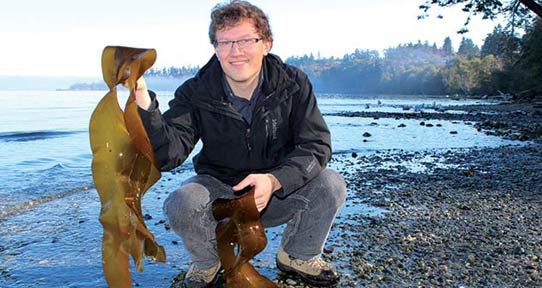Help from kelp

Can a seaweed common to the BC coast help us reduce carbon emissions?
by Mitch Wright
The next generation of biofuel could already be washing up on BC beaches.
Starchy crops such as corn and potatoes,or sugary plants like sugar beets and cane,currently produce the majority of commercial biofuels. But there could be another viable source, one that puts less stress on productive agricultural land—a common brown seaweed known as sugar kelp, or Saccharina latissima.
Aaron Philippsen, a research engineer in the University of Victoria’s Institute for Integrated Energy Systems, says there’s also powerful potential to create a sustainable seaweed biofuel industry and he has the research—his recent UVic master’s thesis—to back it up.
Seaweed—the larger species are generally known as kelp—is already a dietary staple in many Asian countries and a popular ingredient for soups, sushi, snack mixes and even some cosmetic products. It’s also a rich fertilizer.
Philippsen’s study looks at the logistics involved to determine whether the potential ethanol outputs from farmed brown seaweed outweigh the greenhouse gas emissions and energy input required for profitability and sustainability—something that hadn’t been examined previously.
“Only the process of converting seaweed to ethanol had been previously investigated, the overall picture of what a seaweed-ethanol production industry would look like had not yet been examined,” says Philippsen, who became interested in where our fuels come from and how the environment is affected while working on his undergraduate degree.
“My research shows that seaweed ethanol has much lower lifecycle greenhouse gas emissions than current sources of ethanol. This could motivate production of ethanol from seaweed rather than from corn or sugarcane, because seaweed ethanol would produce greater climate benefits per litre of fuel.”
Ethanol produced from a BC-based industry could replace the imported ethanol currently added to gasoline. Also key to the success of the proposal would be minimizing waste by using “co-products” to capitalize on the existing multi-million dollar markets for brown seaweed and exploring potential new markets, such as animal feed sales.
Because farmed seaweed doesn’t compete for farmland, it doesn’t require or compete for irrigation water for growth, and in regions like BC, it does not require fertilizer. Also, it’s far more profitable to make food products out of seaweed than it is to make fuel, so there is no economic incentive to make fuel rather than food.
Another plus? Farming seaweed isn’t a new endeavour. Philippsen says farming is already the established norm for seaweed production around the globe, accounting for more than 90 per cent of global seaweed production. Avoiding biomass removal on the scale needed for commercial ethanol production means seaweed that washes up on BC beaches can remain as a critical part of the natural ocean ecosystem and the coastal food web.
“Seaweed is a foundational part of our coastal cultures and the ocean ecosystem, and that will play a critical role in determining the feasibility of seaweed-based fuel in BC,” he says, adding that consultation will be needed with First Nations, environmental groups, and the public.
“We have good conditions to produce seaweed and seaweed farming is a well-established process, but care is needed to develop a sustainable BC seaweed industry.”
View as PDF (395K).
- Kelp is the general term for large seaweeds known as brown algae. They grow in dense groupings much like a forest on land and provide critical food and shelter for fish, invertebrates and marine mammals. Sugar kelp is fast-growing and can reach heights of two metres.
- Ethanol is a renewable, environmentally friendly fuel that, relative to gasoline, lowers emissions of carbon monoxide by as much as 30 per cent. It’s created through the fermentation of sugars or converted starches. In Canada, ethanol is primarily derived from corn or wheat.
- The Canadian government implemented regulations in 2010 requiring an average of five per cent renewable content in gasoline, as well as two per cent renewable fuel content in diesel and heating oil.
- Sugar kelp has a higher content of fermentable sugar than other common brown seaweeds, like bull kelp. Other species of seaweed could be used as biofuel, but they would incur higher processing costs for delivering the same amount of fuel.
- Seaweed offers additional advantages over land- based crops: it grows much faster, does not contain lignin (like trees and plants) so does not require pre-treatment, and can absorb up to seven times more carbon dioxide than wood.
